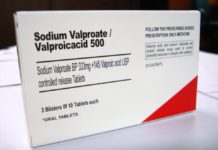Primary Care Practitioners May Mistake Irritability as Bipolar Disorder in Youth
Family medicine and pediatric providers are less confident in their assessment of irritability in youth than psychiatric providers, which may lead to overdiagnosis of bipolar disorder.
The Good, the Bad, and the Ugly: An Infographic on Bipolar Drugs
Bipolar drug therapy is a balancing act of benefits vs. harms. Odds of attributable benefit cluster in a 15-25% band, so 75%-85% don’t see substantial benefit. Stated differently, if five people take a bipolar drug, only one is likely to see substantial improvement due to it, but all five will have side effects.
Valproate Linked to Decreased Brain Volume in Children Diagnosed with Bipolar Disorder
Researchers find that valproate decreases brain volume in a region associated with emotion processing across all participants.
In Memory of Julie Greene
With deep regret, Mad in America announces another loss in our contributor community. Julie C. Greene, writer and antipsychiatry advocate, lost her battle with kidney disease on November 29 at her home in Beaver Falls, Pennsylvania. Julie had been an MIA blogger since 2014, including several pieces on the dangers of lithium.
New Research Documents Widening Mortality Gap for Bipolar and Schizophrenia
Analysis of longitudinal data from 2000-2014 demonstrate mortality gap is widening between persons with a diagnosis of bipolar or schizophrenia compared to the general population
Lithium May Cause Sexual Dysfunction — More Research Needed
Lithium appears to reduce libido and sexual function, and more research into the problem is needed.
Sinead O’Connor Announces: “I’m Not Bipolar . . . I Should Never Have Been...
Singer Sinead O'Connor announced on her website that after several "second opinions" she has learned "I do not in fact suffer from Bi Polar...
Long-term Use of Lithium Can Cause Kidney Failure
A third of patients who have taken the common psychiatric medication lithium for over ten years have developed "chronic renal failure" from the drug.
On Pharma, Corruption, and Psychiatric Drugs
"My studies in this area lead me to a very uncomfortable conclusion: Our citizens would be far better off if we removed all the psychotropic drugs from the market, as doctors are unable to handle them. It is inescapable that their availability creates more harm than good."
- Peter Gøtzsche, MD; Co-founder of the Cochrane Collaboration
Drug Treatment for Borderline Personality Disorder Not Supported By Evidence
New research published in the August issue of Psychiatric Annals evaluates the results of randomized control trials on the use of various psychotropic drugs for patients diagnosed with borderline personality disorder (BPD). Despite the “American Psychiatric Association’s practice guidelines endorsement of SSRIs as first-line therapies for BPD,” the results of the meta-analysis reveal that pharmacotherapy in BPD is “not supported by the current literature,” and “should be avoided whenever possible.”
Antidepressants Associated with Increased Risk for Manic Symptoms
An analysis of medical records in the UK reveals that the use of certain antidepressants for depression is linked to a heightened risk for mania and bipolar disorder. The research, published this week in BMJ Open, found the strongest effect for serotonin reuptake inhibitors (SSRIs) and the antidepressant venlafaxine.
Lowering the Threshold for Bipolar: “More Harm Than Good”
Researchers publishing in the Journal of Clinical Psychiatry argue that broadening the diagnostic criteria for bipolar disorder would result in a greater increase in...
Consequences of Taking the Yellow Brick Road: Lithium Carbonate 1984-1996
I was first given Lithium Carbonate in the spring of 1984, and I was taken off Lithium by my attending physician in 1996, but left on other drugs. It took me until 2012 to realize psychiatry is a sham. So often people tell me, “I don’t care what my life is like ten years from now. I only want to feel good now.” I may have said the same thing twenty years ago. Now I have the hindsight to know that my viewpoint back then was juvenile at best. I try to warn other patients these days. It’s hard to joke around about something that kills people.
Discontinuing Psychotropics Reduces Falls in Elderly
Australian researchers look at the literature on the effect of psychotropics on falls in the elderly; largest effect of any randomized trial was achieved...
Infants Exposed to Psychotropic Drugs During Pregnancy At Risk
New research published in the July issue of The Journal of Clinical Psychiatry found that the use of mood stabilizers, antipsychotics, antidepressants, and hypnotics during pregnancy is associated with increased health risks to the infant.
Lithium
In this piece for Healing Journey, Anne O'Beirne briefly summarizes the history of the medical usage of lithium and describes the impact that the drug has...
Lithium: A Survivor’s Guide for Parents
When I was a young adult, I was misdiagnosed with bipolar disorder and placed on lithium. I am 61 years old now, living on the edge of end-stage kidney disease. If I could undo everything, by all means, I would not have taken this drug. It is not safe for anyone at any age.
”Broken Brains” and “Beautiful Minds”
When I first interviewed Brandon Banks, in the spring of 2008, while researching Anatomy of an Epidemic, he had recently entered Elizabethtown Community College...
Update: Massachusetts Benzodiazepine Bill Hearing
The hearing for Bill H4062: Informed Consent for Benzodiazepines and Non-benzodiazepine Hypnotics took place on Monday – in the middle of an April snowstorm! The discussion clarified some important points in the legislation and gave survivors an opportunity to tell their stories. I was so proud to be there and witness the courage, camaraderie, resilience, advocacy, and vulnerability of fellow survivors. This legislation is our chance to be heard. As one survivor said, through tears, to the committee, “Do not let my suffering be in vain. I beg you to pass this bill.”
Bipolar Patients Have High Drug Burden — Especially Women
Over one third of people with bipolar diagnoses admitted to a Rhode Island hospital were on four or more psychiatric medications, says research published...
Psychiatry: We Need a Truth and Reconciliation Commission in Mental Health
My name is Leah Harris and I'm a survivor. I am a survivor of psychiatric abuse and trauma. My parents died largely as a result of terrible psychiatric practice. Psychiatric practice that took them when they were young adults and struggling with experiences they didn’t understand. Experiences that were labeled as schizophrenia. Bipolar disorder. My parents were turned from people into permanent patients. They suffered the indignities of forced treatment. Seclusion and restraint. Forced electroshock. Involuntary outpatient commitment. And a shocking amount of disabling heavy-duty psychiatric drugs. And they died young, from a combination of the toxic effects of overmedication, and broken spirits.
People Diagnosed with Bipolar Disorder at Increased Risk for Parkinson’s
Increased Parkinson's risk could be related to lithium, antipsychotic, and antiepileptic drug use.
Janssen to Pay $11M for Failure to Warn of Topamax Birth Defects
A Philadelphia jury yesterday ordered Johnson & Johnson subsidiary Janssen to pay $11 million to the parents of a five-year-old boy for failure to warn...
Assessing Increased Mortality Risks of Antipsychotics and Mood Stabilizers in Dementia
An article in January's American Journal of Psychiatry weighs the relative risk of mortality associated with various antipsychotics and mood stabilizers used in the treatment of...
Information on PRN Medication Practices is Lacking
The authors of an article in Journal of Psychosocial Nursing reviewed the literature on psychotropic PRN medications in order to respond to a request to...


















